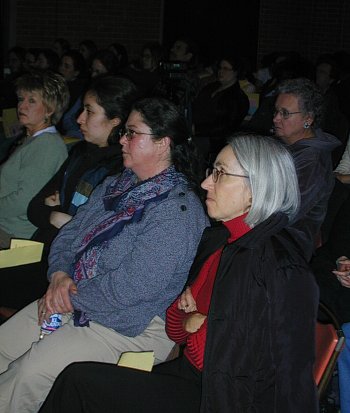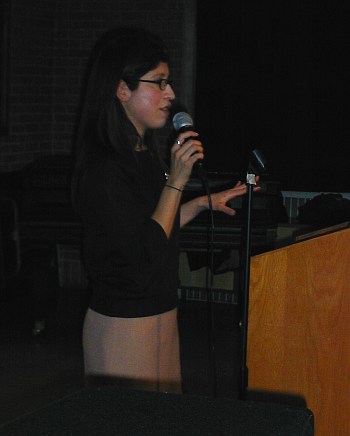|
On February 24th (Thurs.) of 2005, the Community Meeting on
Access to Emergency Contraception (EC) was held at the Illinois Disciples
Foundation (IDF) in Champaign, Illinois, during the evening. This meeting was
sponsored by several women's groups and social service organizations in the
area. The mediator of this event was Brooke Anderson, a staff member of
Champaign County Health Care Consumers, and its keynote speaker was Destiny
Lopez, Director of New York's Emergency Contraception Campaign. There were
several other speakers at this event as well, including a woman who had a baby
because of her inability to obtain EC in a timely manner. About 150 people
attended the community meeting at IDF; there was standing room only for late
arrivals. Beverages and desserts were available to the audience during the
meeting.
About Emergency Contraception
(EC) and Its Local Availability
Speakers Annie Fehrenbacher and Mia Layne described EC to
the audience and how to obtain it locally. EC is available as a prescription
drug in the United States. The only drug that is currently available for this
purpose is called Plan B®, which was approved by the
Food & Drug Administration (FDA) in 1999. Plan B consists of specific
concentrated doses of a chemical that is found in ordinary birth control pills.
If Plan B is taken within 24 hours after contraceptive failure or unprotected
sex, it can reduce the risk of pregnancy up to 95%. If Plan B is taken within
72 hours after either of the preceding situations, it can reduce the risk of
pregnancy up to 89%.
Plan B is not an aborticide and should not be
confused with the drug Mifepristone (formerly known as RU-486). Unlike
Mifepristone, which was approved by the FDA for early pregnancy termination in
2000, Plan B works like regular birth control pills to prevent pregnancy before
a pregnancy is established. Emergency contraception is typically used when: 1)
a condom breaks, 2) two or more birth control pills have been skipped, 3)
voluntary sex occurs without contraception, or 4) a woman is forced to have sex
(e.g., rape). Women who are already pregnant should not use Plan B, nor should
it be used as a substitute for ordinary birth control pills.
Plan B is
considered a safe and effective emergency contraceptive. Some women may
experience side effects, including nausea, abdominal pain, breast tenderness,
or menstrual changes, but these side effects should be temporary as Plan B is
taken in only one or two doses. In Champaign County, Illinois, this emergency
contraceptive can be obtained through Planned Parenthood, one's family
physician, or McKinley Health Center (for students at the University of
Illinois). It is available for free at McKinley Health Center, Monday thru
Saturday, when the university is in session.
The availability of Plan B
at local pharmacies is variable and its price ranges from $18.94 to $35.89. A
recent survey of 21 pharmacies in Champaign County revealed 38% of them had
this emergency contraceptive in stock, 38% of them did not have it in stock but
were willing to order it, while 24% of them refused to carry it. At the time of
the survey, the pharmacies with Plan B in stock included CarleRX Express on
University, CarleRX Express on Cunningham, Christie Clinic on University, Osco
Drug on Green, Osco Drug on Philo, Schnuck's on Vine, Walgreens on Philo, and
Walgreens on Springfield. The pharmacies that refuse to carry Plan B include
Meijer, Provena Covenant, Target Stores, Wal-Mart in Savoy, and Wal-Mart in
Champaign. Unfortunately, ordering an emergency contraceptive that isn't in
stock can reduce its effectiveness significantly because of the time delay.
 Above are some members of the audience.
Emergency
Contraception (EC) and the Bush Administration
Speakers Allison Jones and Emily Sha discussed the need to
make EC more widely available in the United States. The product manufacturer of
Plan B submitted an application to the FDA to switch its status from
prescription-only to over-the-counter. In 2003, a joint panel of the FDA's
Reproductive Health Drugs Advisory Committee and Non-Prescription Drugs
Advisory Committee voted 23-4 to recommend that the FDA approve the application
to make Plan B available over-the-counter. In 2004, the FDA rejected this
application and a sent a "non-approvable" letter to the product manufacturer.
Critics accuse the FDA, which is under the direction of Bush-appointee Lester
Crawford, of playing politics and ignoring the scientific evidence in support
of the safety and effectiveness of this drug. Supporters of the FDA-decision
believe that making EC available over-the-counter would promote teen-age sexual
promiscuity and encourage "pedophiles." However, a recently published study in
the Journal of the American Medical Association (JAMA) found little evidence
that over-the-counter EC affected teen-age sexual activity in California.
In response to the FDA decision to deny over-the-counter status to Plan
B, another speaker, Simon Heller of the Center for Reproductive Rights, has
filed a lawsuit in Federal Court in New York on behalf of several EC activists
and consumers. The lawsuit states that the FDA has discriminated against women
and violated their constitutional rights. This lawsuit seeks to overturn the
FDA decision to deny over-the-counter status for Plan B.
Another
indication that the Bush Administration is hostile to the availability of EC
can be found in the National Protocol for Rape Survivors by the Dept. of
Justice, which functions as a guidance to health care providers throughout the
United States. This recently released document fails to mention EC as a medical
treatment for women who are subjected to rape, which can substantially increase
the risk of unintended pregnancy. A national survey has revealed that only 40%
of health care providers make EC available to victims of rape – this
figure is as low as 6% in some states. Community members are encouraged to
contact Diane Stuart, Director of the DOJ Office of Violence Against Women,
regarding the omission of EC from the protocol. Her e-mail is diane.stuart@usdoj.gov and her telephone number is (202) 307-6026.
Campaign to Make Emergency
Contraception (EC) More Available in the States
Several industrialized and developing nations have already approved
over-the-counter EC drugs. While the FDA under the Bush Administration has
blocked the availability of EC as an over-the-counter drug, several states in
the U.S. have approved legislation that makes Plan B available through a
pharmacy without a prescription after consulting with a pharmacist. These
states include Alaska, California, Hawaii, Maine, New Mexico, and Washington.
Similar bills have been introduced in Illinois and New York that are still
pending. Making EC available over-the-counter or through a pharmacy without a
prescription avoids the costs and time delays that are often associated with
making an appointment with a physician. Some women can't afford the cost of a
physician, while others (e.g., those on Medicaid) are forced to wait several
months before they can see a physician. Thus, making EC available
over-the-counter or through a pharmacy without a physician would make such
drugs more widely available in less time than is currently the case.
In
Illinois, activists from local women's groups and social service organizations
have met with Naomi Jacobsson, the State Representative of Champaign-Urbana and
the surrounding area, encouraging her to become a co-sponsor of HB 6577 in the
state legislature. Similar to the legislation of the 6 preceding states, HB
6577 would make emergency contraceptives (such as Plan B) available through a
pharmacy without a prescription after consulting with a pharmacist. Recently,
these activists have received a letter from Rep. Jacobsson, in which she agreed
to be a co-sponsor of this bill. Rep. Jacobsson was unable to be present at the
Community Meeting on Access to Emergency Contraception because she was
attending a legislative session in Springfield, Illinois. Community members are
encouraged to contact their state legislators in support of HB 6577, which
would make EC more available to women in a timely manner within the state of
Illinois.
 Above is the keynote speaker, Destiny Lopez.
Discussion of the Keynote
Speaker about Emergency Contraception (EC)
The keynote speaker, Destiny Lopez, described various issues that are
related to EC and its availability, particularly in New York. She stated that
about 25% of private colleges do not provide EC on campus to their students. In
addition to the 6 states that allow access to EC through pharmacists, there are
12 states that require hospitals to offer EC to women who have been subjected
to rape in emergency rooms. In Congress, there is pending legislation that
would provide $10 million for EC education and outreach. Many women are still
unfamiliar with EC and can confuse it with an aborticide. In the United States,
there are up to 1,000,000 unintended pregnancies per year – the highest of
any industrialized nation. About one-half of these unintended pregnancies end
in abortion. According to Ms. Lopez, Latino women have the second highest rate
of unintended pregnancies, while African-American women have the highest rate.
She states that anti-abortionists should support making EC more accessible to
women in a timely manner because it can reduce the number of abortions. The
Alan Guttmacher Institute estimated that 51,000 abortions were prevented by EC
use in 2000, and that the increased use of EC accounted for up to 43% of the
total decline in abortions between 1994 and 2000. These numbers would be higher
if more women used EC to prevent unintended pregnancies. Unfortunately, the
majority of women of reproductive age in the United States do not know about
EC.
In New York, it was estimated by the Office of the Comptroller that
the state would achieve $450 million per year in savings if EC was more widely
available to prevent unwanted pregnancies. In New York City, EC is available
for free at STD Health Clinics to residents. Outside of major metropolitan
areas, Ms. Lopez suggested that county-wide Public Health Districts could make
EC available for free to reduce the incidence of unwanted pregnancies. In New
York City, legislation was passed in which pharmacies can be fined $250 if they
run out of EC. However, this law was not well-received by the
pharmacies.
The keynote speaker described the attitudes of Latinos in
New York City to EC and similar reproductive issues. The terminology that is
often used by English speakers, such as "pro-choice," "reproductive rights,"
and "emergency contraception," often don't resonate well with Spanish-speaking
Latinos and are poorly understood. Latinos in New York City are primarily of
Puerto Rican descent and they receive information about reproductive issues
from the Catholic Church (and some evangelical churches to a lesser extent).
Although they are often against abortion, Latinos often don't follow the
doctrines of church leaders on other reproductive issues and they support
Medicaid funding of reproductive health care. In Latino households, it is
important to include men in the decision-making process on reproductive issues.
Therefore, education and outreach on EC will be more effective if they are
directed at members of both genders. Ms. Lopez stated that education and
outreach are quite important in making Latinos more aware of EC so that they
are more likely to use it and are less likely to confuse EC with abortion.
|



